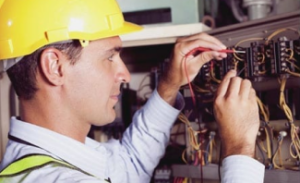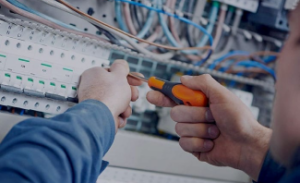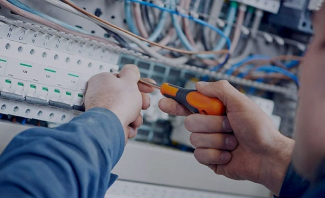The Ultimate Guide to Becoming a Master Electrician
Looking to embark on a career in the electrical industry? If so, Masters of Electricity: The Ultimate Guide to Becoming a Master Electrician is the perfect addition to your reading list. This comprehensive guide is packed full of invaluable tips, tricks and advice on every aspect of the electrical trade. From understanding the basics of power distribution and wiring to advanced techniques for installing complex systems, this guide has it all. Written by industry-leading experts, this guide offers a unique insight into the world of electrical engineering, providing readers with the knowledge and tools they need to build a successful career in this thriving field.
What Is An Electrician and What Do They Do
An electrician is a skilled tradesperson who specializes in installing, maintaining, and repairing electrical systems. They are trained to work with various types of electrical equipment, including wiring, controls, motors, and lighting. Electricians work in a range of industries, such as residential, commercial, and industrial. They play a crucial role in ensuring that electrical systems are safe and functional.

One of the main tasks of an electrician is to install and maintain electrical systems. This includes running wiring and conduit, installing fixtures, and setting up control systems. They must also clean and maintain electrical equipment, perform regular inspections, and troubleshoot problems that may arise. In addition, electricians must stay up-to-date on new technology and code requirements to ensure that electrical systems are safe and meet regulatory standards.
Another key responsibility of an electrician is to ensure the safety of electrical systems. This includes inspecting wiring for damage, checking electrical outlets and fixtures for proper grounding, and testing circuits to identify potential hazards. Electricians must also be trained to work with high-voltage electrical systems safely and responsibly. They use protective gear, such as gloves and goggles, to avoid electrical shock and other hazards associated with working with electrical equipment. In summary, electricians play a crucial role in maintaining safe and functional electrical systems, making them an important part of any construction or renovation project.
The Different Types of Electricians and Their Responsibilities
There are several types of electricians, each with their own set of responsibilities and specialties. Here are some of the most common types of electricians you may encounter in your career:
- Residential Electrician: These electricians specialize in working on wiring systems for homes and apartments. They handle tasks such as installing lighting fixtures, outlets, and electrical panels.
- Commercial Electrician: Commercial electricians work on larger-scale projects, such as wiring for commercial buildings, offices, and retail spaces. They handle complex electrical systems and may also be responsible for maintenance and repairs.
- Industrial Electrician: These electricians are trained to work with high-voltage electrical systems found in industrial settings like factories or power plants. They must have a strong understanding of safety protocols and specialized equipment such as motors and generators.
- Maintenance Electrician: These electricians specialize in the maintenance and repair of existing electrical systems. They are often responsible for conducting regular inspections, troubleshooting issues, and making necessary repairs to keep systems functioning properly.
No matter what type of electrician you become, it is important to continue learning and growing in your field. With new advancements in technology and changes to electrical codes, it is crucial for electricians to stay current and adapt to new methods and techniques.
Requirements to Become a Master Electrician
In order to become a master electrician, there are several requirements that you must meet. First and foremost, you must have completed a rigorous apprenticeship program, typically lasting four to five years. During this time, you will have gained a great deal of practical experience working under the guidance of experienced electricians. Additionally, you must have a thorough understanding of the National Electric Code, as well as the ability to read and interpret complex electrical schematics.
Another important requirement for becoming a master electrician is having a solid foundation in mathematics and physics. This includes knowledge of algebra, geometry, trigonometry, and calculus, as well as an understanding of basic concepts in mechanics, thermodynamics, and electromagnetic theory. Strong analytical skills are also essential, as master electricians must be able to interpret complex data and make informed decisions.
Finally, to become a master electrician, you must be licensed by your state’s licensing board. This involves passing a rigorous exam that tests your knowledge of electrical codes, regulations, and safety practices. You will also need to demonstrate your ability to perform electrical installations and repairs in a safe and efficient manner, and maintain high standards of professionalism and accuracy at all times. By meeting these requirements, you can gain the skills and knowledge needed to become a successful and highly respected master electrician in your community.
Must-Have Skills and Qualifications Required for Becoming a Master Electrician
A master electrician is a professional who works with electrical systems, ensuring that they are installed and maintained in a safe and efficient manner. To become a master electrician, several skills and qualifications are necessary. Firstly, a good understanding of electrical systems is required. This includes knowledge of different types of wiring, circuits, and electrical codes. Additionally, a master electrician must have excellent problem-solving skills and the ability to troubleshoot complex electrical issues.
Secondly, strong technical skills are a must for anyone aspiring to become a master electrician. This includes the ability to read and interpret electrical blueprints and schematics, as well as a good understanding of electrical motors and transformers. It’s also important to have practical skills such as the ability to use hand tools and power tools, as well as knowledge of electrical testing equipment.
Lastly, a master electrician must possess excellent communication and interpersonal skills. They will need to be able to work well with others, including clients, co-workers, and other contractors. Good communication skills are also necessary for working with customers to understand their needs and providing them with the appropriate solutions. A master electrician must also be able to explain complex electrical issues in simple terms to non-technical individuals.
Becoming a master electrician requires a wide range of skills and qualifications. Strong technical skills, electrical system knowledge, practical experience, and excellent communication skills are all must-haves for anyone wanting to succeed in this profession. With these skills and qualifications in hand, you can build a successful career as a master electrician.
The Different Types of Electrical Installations & Projects You’ll Be Doing as a Master Electrician
As a master electrician, you will be responsible for overseeing and performing a variety of electrical installations and projects. These tasks can vary depending on your area of specialization, but here are some common types of projects you may encounter in your career:
- New Construction: This involves working with contractors to plan, install, and test the electrical systems in new buildings or homes.
- Renovations: As a master electrician, you may also work on renovation projects, which involve updating or repairing electrical systems in existing structures.
- Wiring and Rewiring: This task involves running wiring throughout a building to provide power and electricity to various outlets and appliances.
- Electrical Upgrades: With advances in technology, there is a constant need for upgrading electrical systems to meet new safety standards and accommodate larger electrical loads.
- Electrical Maintenance: As a master electrician, you may be responsible for conducting regular maintenance on existing electrical systems to ensure they are functioning properly and safely.
- Emergency Repairs: In the event of a power outage or other electrical emergency, you may be called upon to quickly troubleshoot and repair issues in order to restore power and safety to a building.
- Solar Panel Installations: With the rise in popularity of renewable energy sources, many master electricians are now involved in installing and maintaining solar panel systems for residential and commercial properties.
- Home Automation: As technology continues to advance, more homes are being equipped with smart home systems that require electrical installation and maintenance.
By being well-rounded in different types of electrical installations and projects, you can become a valuable asset to any company or client as a master electrician. Whether it’s working on new construction or upgrading existing systems, your skills and expertise will be in high demand in the ever-evolving field of electrical work.
The Benefits and Challenges of Becoming a Master Electrician
Becoming a Master Electrician is an exceptional achievement that brings numerous benefits. Let’s explore why this qualification is highly sought after and the challenges it entails.
First and foremost, being a Master Electrician grants you the opportunity to work independently and receive higher pay due to the demand for your skills. Your expertise and creativity shine as you design and implement complex electrical systems in various settings, including homes, small businesses, and large construction sites. This diversity keeps the job fresh and stimulating.

However, the path to becoming a Master Electrician is not without its hurdles. This certification demands extensive training and education, which can span over several years. Additionally, the job can be perilous, with risks of electrocution, falls, and exposure to extreme weather conditions. Consequently, adhering to safety regulations and wearing protective gear is vital for a successful career.
Despite the challenges, the advantages of becoming a Master Electrician far outweigh the drawbacks. Financial stability and personal fulfillment await those who enjoy problem-solving and working on intricately designed electrical systems. This profession offers constant learning opportunities with new technologies and regulations, allowing you to make a significant impact on people’s lives.
In conclusion, a career as a Master Electrician is a rewarding path that provides stability, continuous growth, and the chance to ensure the safety and reliability of electrical systems. However, it requires dedication, patience, and a strong commitment to safety. By embarking on this journey, you contribute to a safer world and enhance the quality of life for countless individuals.
Resources for finding Jobs as a Master Electrician
Master Electricians are responsible for designing, installing and maintaining electrical systems in various types of buildings, ensuring the safety, functionality, and energy efficiency of these systems. Master Electricians are in high demand, and the job opportunities continue to rise as the world becomes more electrified. Finding jobs as a Master Electrician may seem daunting, but there is no need to worry because there are a plethora of resources available to you.
Job boards like Indeed, Monster and Glassdoor are great places to start your job search as a Master Electrician. They allow you to search for jobs by location, keyword, and salary, among other parameters. Most of these job boards also feature company reviews and ratings from current and former employees. This information provides helpful insights into the company’s culture, work environment, and management style, helping you make informed decisions when choosing prospective employers.
Networking is an excellent way to find job opportunities as a Master Electrician. Joining professional organizations such as the National Electrical Contractors Association (NECA) can help you build relationships with other electricians and increase your visibility in the industry. Volunteering at trade shows, conferences, and career fairs can also help you expand your network and put yourself in front of potential employers.
Lastly, working with a staffing agency that specializes in the electrical trades can be an efficient way to find job opportunities. Staffing agencies take the stress out of job hunting because they handle the application and interview process for you. They can help place you in short-term and long-term job opportunities, as well as offer training and support to help you stay up-to-date on the latest industry trends and regulations.
In conclusion, finding jobs as a Master Electrician is easier than you think. Take advantage of job boards, networking opportunities, and staffing agencies to help you find job opportunities that meet your unique needs and requirements. With persistence and a proactive approach, you’ll be in your dream job in no time!
In conclusion, becoming a master electrician requires both technical knowledge and practical skills. It is a highly respected profession that involves working with complex electrical systems and ensuring their safety and efficiency. By obtaining the necessary qualifications and continuously learning and improving your skills, you can build a successful career as a master electrician. Remember to always prioritize safety and professionalism in all of your work, and you will become a highly valued member of the electrical industry. So, if you’re ready for a challenging and rewarding career in the electrical field, becoming a master electrician may be the right path for you. Keep learning, growing, and honing your skills to succeed as a master electrician.
https://www.google.com/maps?cid=3969260459347426251

